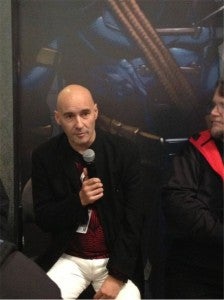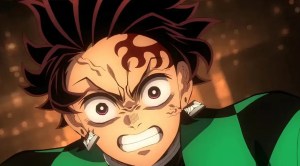Alan Moore, co-creator of League of Extraordinary Gentlemen, Watchmen and V for Vendetta, is routinely very critical of the comics industry in general, but he does have a handful of favorite targets.One of those is Grant Morrison, creator of The Invisibles and writer of All-Star Superman and impressive runs on JLA, New X-Men and Batman. Moore likes to paint Morrison as an imitator whose fame is largely thanks to trading on Moore’s ideas, an accusation he also levels at Geoff Johns, among others.Generally, the pair have a low-simmering feud, but following a series of interviews in which Moore was asked to address it, he did so with vigor. Morrison has elected to respond with a lengthy rebuttal of Moore’s attacks at The Beat, some of which is pretty fascinating stuff.”I find it tragic but quite pertinent to this piece that the loudest voice in our business – the one that carries the furthest and is taken most seriously by the mainstream media – is the one that offers nothing but contempt and denunciation, with barely a single good word to say about any of the many accomplished and individual writers currently working in mainstream comics, let alone the wealth of brilliant indie creators,” Morrison said of Moore.That might be a general observation but certainly feels a bit specific given the most recent round of press that Moore has done, following the announcement of Before Watchmen.Following the announcement, Moore told The New York Times, “I tend to take this latest development as a kind of eager confirmation that they are still apparently dependent on ideas that I had 25 years ago.” Morrison also took the opportunity to speak up in defense of his friend Geoff Johns at some length, saying:
Videos by ComicBook.com
Moore includes Geoff Johns among the “parasites” and “raccoons” rooting through his trash. Why? Because Johns seasoned his own epic expansion of the Green Lantern mythos with a couple of minor elements from Moore’s Green Lantern short story “Tygers” (1986) – a story that was itself created to make sense of a plot hole in the 1959 Green Lantern origin by Gardner Fox!So, in fact, both Moore and Johns were simply doing their work-for-hire jobs by adding to and expanding upon the many-authored quilt that is DC, and specifically Green Lantern, continuity. In a shared narrative universe, such as those of DC or Marvel, any element introduced into the continuity surely becomes part of the backstory and is therefore available to other writers to build upon or incorporate. Johns’ Green Lantern work and the “Blackest Night” story in particular would have worked as well without any reference to “Tygers”, in fact. Why the sneering, dehumanizing putdown? Who chastises a man for the unspeakable crime of synthesizing prior elements of Green Lantern’s back story into his own fresh and personal creative vision for the character, m’lud?Would Moore have appreciated a comparison to vermin snuffling among Gardner Fox’s garbage for treats when he brought Fox’s Floronic Man back from the archives to feature in a “Swamp Thing” (Len Wein’s trash!) story? What obsessive snouting around in the municipal tip does “League of Extraordinary Gentlemen” reduce to if we regard Alan Moore’s endeavours through the same unforgiving lens he applies to Geoff Johns’ work?Geoff Johns like the rest of us, has his own identifiable obsessions as a writer. He has his own interests, his own points of view, and his own way of articulating his ideas via his chosen medium. I know for a fact that Geoff has seen and done and endured things in his life that Alan Moore is unlikely ever to experience, yet Moore automatically brands him creatively bankrupt and tries to insists that Johns’ imagination is so low on fuel, it relies for sustenance on his own. If I can speak up for a friend, Geoff Johns, like the rest of us, like anyone who picks up a pen to earn a living, has plenty to say and, with all respect, he doesn’t need Alan Moore’s help to say it.
The article also deals with allegations made by best-selling author (and friend of Moore’s) Michael Moorcock that Morrison had stolen from his works, an allegation Morrison denies.”Moorcock’s spurious allegations of creative theft are based on exactly TEN pages of material in issues 17-19 of The Invisibles,” the writer said. “These pages were explicitly presented as a Moorcock pastiche – or more strictly a pastiche of my own Gideon Stargrave stories from Near Myths, which were heavily but not entirely influenced by Moorcock and J.G Ballard – occurring in the head of the fictional character King Mob. King Mob actually talks about his obsession with Jerry Cornelius within the story and I reference Moorcock’s work as an inspiration for these pages in the letters column of issue 17.”The Invisibles frequently did such things, incorporating literary characters, celebrities and historical figures into its larger narrative, so surely Moorcock isn’t the only one to have seen his work show up there, but he’s certainly the one most offended by it.You can check out the full interview–thousands of words from both Moore and Morrison, with links and research–at the link above.










